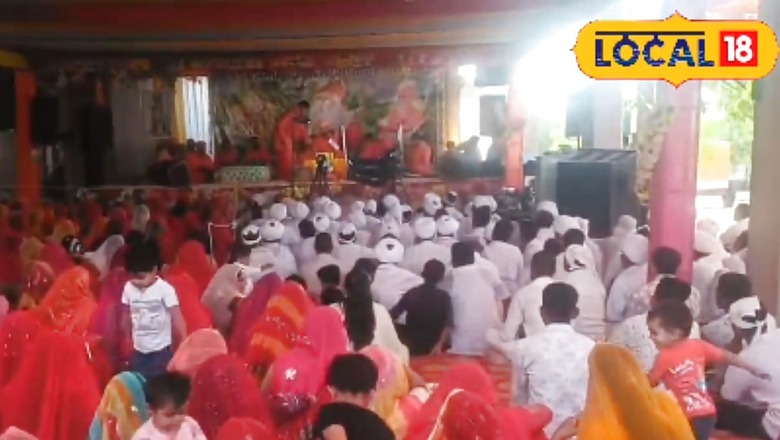
views
The recent murder of former Maharashtra minister and NCP leader Baba Siddique has put Bollywood actor Salman Khan back in the crosshairs of the Lawrence Bishnoi gang, reigniting threats related to the 1998 blackbuck poaching case.
The Bishnois, a religious sect prominent in Rajasthan and Haryana, adhere to a strict code of conduct laid down by their founder, Guru Jambheshwar.
Saint Rajuram, a prominent figure in the Bishnoi community, explained the 29 rules set by the Guru and highlighted the significance of each one. History is replete with examples of Bishnois making the ultimate sacrifice to uphold these tenets. From the courageous sisters Karma and Gaura who laid down their lives protecting trees in 1730 to the countless others who followed in their footsteps, the community’s dedication to their beliefs is unwavering.
Who was Guru Jambheshwar?
On August 28, 1451, a son was born to a Kshatriya family in Rajasthan’s Pipasar village. His father, Lohtji Panwar, hailed from the esteemed lineage of the Lohtji Panwar clan within the princely state of Nagaur. This period, known as Bhaktikal, was marked by spiritual fervour.
The child was named Dhanraj. Young Dhanraj’s early years were shrouded in concern as he was non-verbal for the first seven years of his life, earning him the unfortunate moniker ‘goonga gala’ (dumb throat).
A dramatic shift occurred on his seventh birthday when Dhanraj, as though touched by divine intervention, began to speak. This marked the beginning of his spiritual awakening. Around the same time, he took on the responsibility of grazing cows, a seemingly ordinary task that would deeply influence his profound connection with nature.
At the tender age of 16, his life took another significant turn when he encountered the revered Guru Gorakhnath. This meeting proved to be a pivotal moment, igniting within him a thirst for spiritual knowledge and setting him on the path to becoming the revered Guru Jambheshwar.
The teachings of Guru Jambheshwar resonated deeply with the people, inspiring many to become his followers. In 1485, at the age of 34, he held a havan atop a massive sand dune near the village of Muqaam, a site now revered as Samrathal Dhora.
This momentous event marked the formal establishment of the Bishnoi sect, symbolized by the consecration of a sacred kalash.
Guru Jambheshwar’s uncle, Pulhoji, became the first to embrace this new faith. To guide his followers, Guru Jambheshwar laid down 29 principles, forming the core tenets of the Bishnoi way of life.
These 29 principles govern every aspect of their lives, promoting peace, environmental conservation, and social harmony. This code, known as the ‘29 principles’ or ‘29 niyam’, emphasize environmental protection, compassion for all living beings, and spiritual growth.
The name “Bishnoi” itself reflects these principles, with ‘Bis’ meaning ‘20’ and ‘Noi’ meaning ‘nine’ in the local Marwari language.
This deep respect for nature has led the Bishnoi to make significant sacrifices. During the British Raj, a Bishnoi farmer named Taroji Rahhad courageously challenged a British officer who was hunting blackbucks. Rahhad’s unwavering hunger strike ultimately led to a hunting ban in the region. This act of defiance, echoed by countless others within the community, including those who paid the ultimate price, solidified the Bishnoi’s reputation as staunch protectors of the natural world.
The blackbuck, an antelope species native to India, shares a unique and deeply intertwined relationship with the Bishnoi community. The black buck holds a particularly sacred place within these beliefs, so much so that the Bishnoi consider the antelope to be family. Stories abound of Bishnoi women breastfeeding orphaned fawns, showcasing the extraordinary lengths to which they will go to safeguard these animals.
The 29 Tenets of Bishnois
The Bishnoi community adheres to this distinct set of ‘29 Rules’ which serve as a comprehensive guide to living a life deeply intertwined with nature, spirituality, and communal harmony.
- Observe sutak (state of ritual impurity) for 30 days.
- Bathe every morning.
- Practise modesty and contentment.
- Maintain external and internal purity.
- Perform Dwikal Sandhya-Upasana (worship twice daily).
- Sing aarti and harigun in the evening.
- Perform havan with devotion and love.
- Filter water, fuel, and milk before use.
- Think carefully before speaking.
- Be forgiving and compassionate.
- Do not steal.
- Avoid criticism.
- Do not tell lies.
- Avoid arguments.
- Fast on Amavasya (New Moon day).
- Worship Lord Vishnu.
- Show compassion to all living beings.




















Comments
0 comment